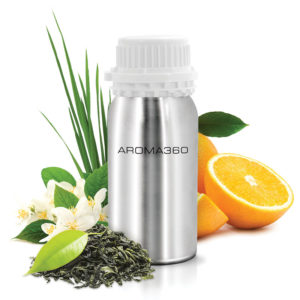BOCA RATON, FL—Guests want a truly local, authentic experience. Hoteliers are responding to this with F&B offerings that feature local ingredients and recipes, and design that’s multisensory, with different textures and patterns, as well as a local touch. Sight, taste, touch—all of the senses are important when it comes to creating a sense of place. But none may be more important than smell.
“The way scent works goes back to prehistoric times when we used our sense of smell for survival purposes,” said Farah Abassi, founder of boutique sensory branding company Aroma360. “There’s something called olfactory receptors in our noses, and those have a direct path to the limbic system of our brain.” Known as the emotional center of the brain, the limbic system is critical for humans, supporting numerous functions in the body, primarily related to emotion, behavior and long-term memory. “This system is where you have those positive memories and emotions—it affects your mood; before you even can process the scent and know what it is, you already react to it,” Abassi said. “You’re already feeling warm and happy and comfortable; scent’s one of the most fascinating of all the senses.”
What does this mean for hotels? A way to create a great first impression. “Walking into a hotel is an experience in itself, and hotel owners and managers have a split second to create that first impression. Scent is a really great way to create a really lasting first impression because of the amazing connection it has with the emotional centers of our brain,” Abassi said. “As soon as guests walk in the door, they’re going to notice everything—lighting, the decor, the person who opens the door for them, and scent is another element to add to that experience. A hotel owner has a really great opportunity to use scent to reaffirm the brand experience and keep that emotional connection to the experience at the hotel and the vacation, connecting it back to the brand.”
And, because scent, emotion and memory are so intrinsically linked, it makes the branding that much more powerful. “If somebody goes back to that hotel again, scent creates that sense of familiarity and comfort; or maybe it’s not the exact same hotel, but it’s another location of the [brand], and it’s really cultivating that same sense of familiarity, comfort and capturing those emotions,” Abassi said.
 While many hotels are beefing up their designs and services to create better experiences, Abassi said there has also been an increased focus on using scent as a part of that overall branding. “Scent branding used to be a very luxurious service that was reserved for only the five-star-plus hotels, and now we’re seeing it’s not just something that’s ultra-exclusive,” she said. “It’s becoming accepted and accessible for hotels of all calibers. We’re seeing the demand grow tremendously for signature scents and creating a really unique experience.”
While many hotels are beefing up their designs and services to create better experiences, Abassi said there has also been an increased focus on using scent as a part of that overall branding. “Scent branding used to be a very luxurious service that was reserved for only the five-star-plus hotels, and now we’re seeing it’s not just something that’s ultra-exclusive,” she said. “It’s becoming accepted and accessible for hotels of all calibers. We’re seeing the demand grow tremendously for signature scents and creating a really unique experience.”
How does scenting technology work? Companies like Aroma360 do a lot of research. “It’s an interview process; we ask a lot of questions, we take a deep dive into the branding aspects, the marketing aspects, the mission, the customers—every aspect that makes that hotel unique and different,” Abassi said. “We try to translate those unique features into scent notes. You really want to capture the emotional vibe of the hotel, use the similar emotions that are evoked by particular scents and have them mesh in harmony.” This process can take anywhere from one meeting to six months, depending on the complexity of the process, how many stakeholders are involved, etc.
Before installing scenting technology, there are a few questions hoteliers should ask themselves. First and foremost: Who are the guests and what type of experience are you trying to create? A family-friendly property near Disneyland in California would want a different scent than a high-end boutique hotel in New York City; similarly, a Miami Beach resort likely isn’t looking to capture the same guest as a property in Aspen, CO. “Understanding who your clients are, understanding what makes your property different, what emotions you’re trying to evoke are things that are really important to think about and incorporate into the scent marketing aspect,” Abassi said. “Make sure there’s consistency with the clients’ needs and the scent brand message.”
Once a scent has been chosen, it’s diffused through a central heating and cooling system. For its part, Aroma360 uses cold-air diffusion, which breaks down the oils into a dry mist of nanoparticles with the use of cold, filtered air. This mist is released into the HVAC ducts, sending the scent into the desired areas.
“This is the best way to scent for a few reasons—it’s a very even, consistent scenting approach, so you’re not going to have the highs and the lows,” Abassi said. “Because you worked with the HVAC ductwork, it’s going to spread through the space nicely and evenly. The biggest thing to remember with scent is you want it to be something that adds to the ambiance and the environment and doesn’t shock, overwhelm or offend people by being too strong. The HVAC systems are the best for getting that scenting experience.”
Hotels also have full control over the scent in the hotel. “Everything is digitally programmed, so you can have it stronger during certain times of the day when you have more traffic and doors are opening, and softer during times of less action,” she said, noting this will help maintain a consistent experience.
While many hotels will use scenting technology in their lobbies, Abassi said that it’s often useful to supplement this to create a better experience. “I always suggest for my hotel clients that they take their scent and not just look at it as being something they pump through the lobby so it’s a one-and-done thing. The more touchpoints, the more times the guest is exposed to the scent, the stronger they’re going to associate the scent to the experience,” she said.
“We get a lot of requests from people who have been to a hotel and have had such a positive experience at that hotel, that they need to have that fragrance for their home; they want to continue that positive experience and bring it home with them,” Abassi continued. “Our 360 program is something we offer our signature-scent clients; we take their signature scent and incorporate it into different products, such as retail products like candles and sprays, or the hotel amenity line. This not only reaffirms the scent, but also opens up revenue channels and allows the guest to take that experience home with them.”
While the retail aspect opens up potential revenue streams, so does the scent diffused through the HVAC system—one only has to look at several scent marketing studies done in retail settings to see that. “There’s a well-known piece with Nike where intent to purchase increased by 84% when the same pair of shoes was presented in a scented room versus an unscented room. There’s another study, also with Nike shoes, that they’re willing to pay an extra $10.33 when the shoes are presented in a scented room versus an unscented room,” Abassi said. “A lot of that has to do with the unconscious impact scent has on us. When we smell something that is luxurious, curated, your brain automatically shifts into thinking it is more valuable.”
And that’s something to bear in mind, considering lobbies have become congregation spots—places hotels are ushering guests toward with multiple seating options, grab-and-go markets, lobby bars and restaurants, and other offerings to create a space where guests can live, work and play. “We’ve seen that people will spend more time when they’re in an environment that smells great. It stimulates their appetite, and they’re just in a better state of mind as opposed to walking into a restaurant or bar that might have a negative smell,” Abassi said. “That creates a negative tone because it doesn’t seem as clean and luxurious and fresh. And then it translates that they don’t want to spend as much time in an environment that doesn’t smell as great. With regard to hotels, it’s really about the guest experience… If they have a positive first impression, it’s going to set the tone for their whole stay.” HB


